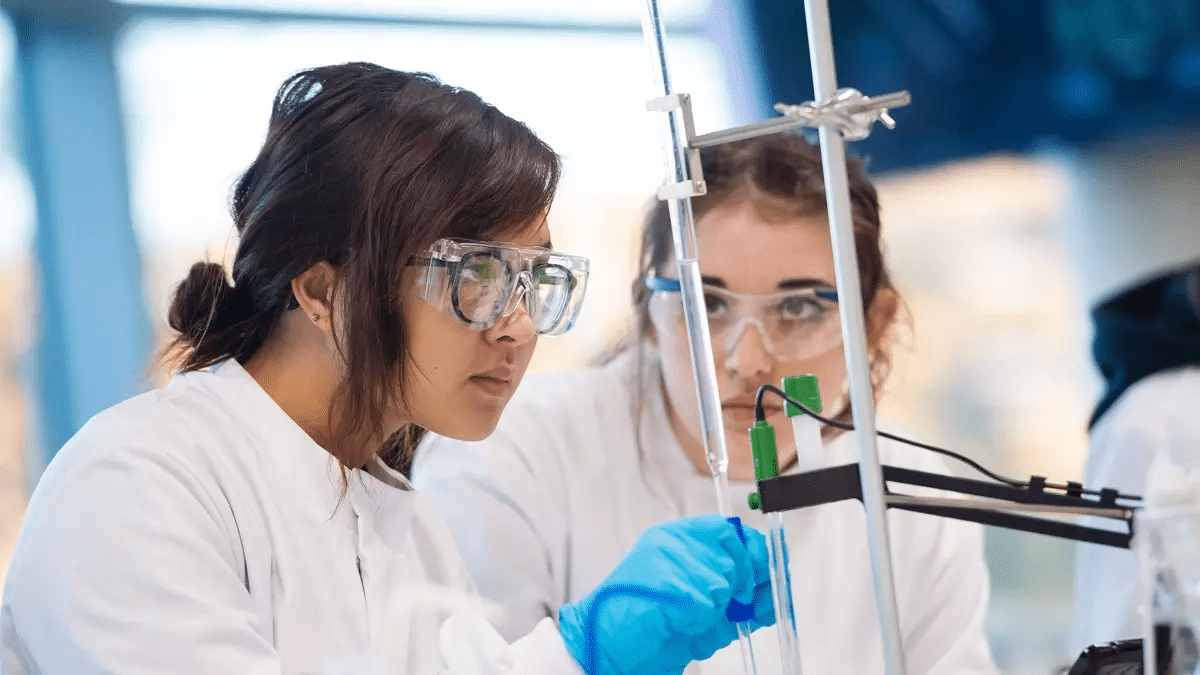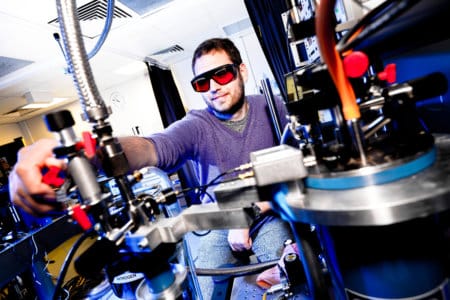If you’re passionate about positively impacting people’s lives through the development of life-saving medicine, a career in pharmaceutical sciences is an excellent choice. Pharmaceutical scientists are behind some of the most impactful products and services that enhance the well-being of individuals around the world today. They’re advancing chemotherapy, discovering antiretroviral drugs that can suppress HIV levels, and developing a human antibody that can help to reverse signs of opioid overdose.
By pursuing an advanced degree in this field at the University of Surrey, you’ll lay the foundation for a superb array of career prospects in an industry that’s booming in the UK and abroad. Nestled in Guildford, Surrey and close to London, Surrey offers two master’s programmes in pharmaceutical sciences: Pharmaceutical Sciences MSc and Pharmaceutical Sciences with Industrial Practice MSc. The latter includes a year in industry. In both, you’ll explore the life of medicine, from drug discovery to manufacture and quality control — and its immeasurable impact on the world.
“The importance of developing new medicines is globally recognised,” says Dr. Milan Antonijevic, who leads the programmes. “Our two master’s programmes focus on the life of pharmaceuticals: from drug discovery; through formulation, manufacture and quality control of API (Active Pharmaceutical Ingredient); to final medicines and medical devices. Safety and benefit to the patient are at the core of everything we teach.”
Active researchers in their respective fields teach these up-to-date and industry-relevant modules. They include Dr. Antonijevic, an expert in pharmaceutical analysis and the use of thermal analytical techniques to study pharmaceutically important molecules, working on solubility enhancement of poorly soluble drugs; Professor Adrian Dobbs, an expert in the development of new synthetic methodologies; Professor Tao Chen, a computational and data scientist, working on digital technologies for chemical engineering applications; and Professor Charley Wu, an expert researcher who has run industrial collaborative research projects with Pfizer, AstraZeneca, MSD and Sanofi in development of advanced numerical modelling techniques for pharmaceutical application; as well as Dr Lian Liu, an expert in particle technology and formulations for health applications.

All modules in the Pharmaceutical Sciences include a laboratory component. Source: University of Surrey
What sets this programme apart is how hands-on it is. All modules have a laboratory component. Specialist modules, meanwhile, focus on current industry knowledge and standards, covering the entire pharmaceutical lifecycle. This approach ensures that students understand the theory and know how to apply it in real-world scenarios — often in world-class facilities. The unique Pilot Plant facility is one of them and only one of a few in the country to replicate a real-world environment with industry-standard equipment.
Learning from world-leading experts and conducting cutting-edge research in amazing facilities have prepared many Surrey graduates to create an impact in their careers. And sometimes, even before they graduate. “Pharmaceutical scientists are vital in fighting diseases like the coronavirus, and we prepare our students to make a real difference in global health,” says Dr. Antonijevic.
Like many other industries, what lies ahead for the field is a future intertwined with the potential and pitfalls of artificial intelligence. As AI becomes more effective and efficient in helping industries with data and number-related problems, big pharma is increasingly interested to use it in drug development. The industry is predicted to spend US$50 billion annually on AI within a decade, according to Morgan Stanley, an investment bank. Surrey recognises this. Both programmes incorporate AI into their curriculum — which is continuously updated by the industrial advisory body — enabling students to stay informed on the latest goings-on at the confluence of technology and medicine.
The course structure is just as forward-looking. The MSc programmes have no end-of-semester exams. Instead, students benefit from continuous assessment, which fosters feedback-driven learning and offers students a more engaging and effective learning experience.

The Pharmaceutical Sciences MSc enhances your employability and leads to superb career prospects. Source: University of Surrey
With many employability-boosting features in the MSc, your horizons are limitless as a graduate. “Surrey has an enviable record in the graduate jobs market, with consistently large numbers of graduates going into high-skilled jobs when they leave,” says Alastair McCall, editor of The Times and The Sunday Times Good University Guide. “This is no accident; the pathways to their later success are laid down during their studies. In an increasingly competitive graduate jobs market, a degree from the University of Surrey opens doors.”
Employers know a Surrey degree as one that comes from a university ranked 13th in the UK Complete University Guide 2024 league table and 244th in the QS World University Rankings 2024 — and where 95% of postgraduate students go on to work or further study. (Graduate Outcomes 2023, HESA). They have the support of an award-winning careers service throughout their journey here and for three years after graduation.
For those aspiring to join Surrey’s pharmaceutical science programmes, the university offers early payment discounts for February 2024, as well as international excellence scholarships, ensuring that deserving students have access to world-class education.
Interested? Learn more about Pharmaceutical Sciences at Surrey.
Follow the University of Surrey on Facebook, X, LinkedIn, Instagram, TikTok, and YouTube













